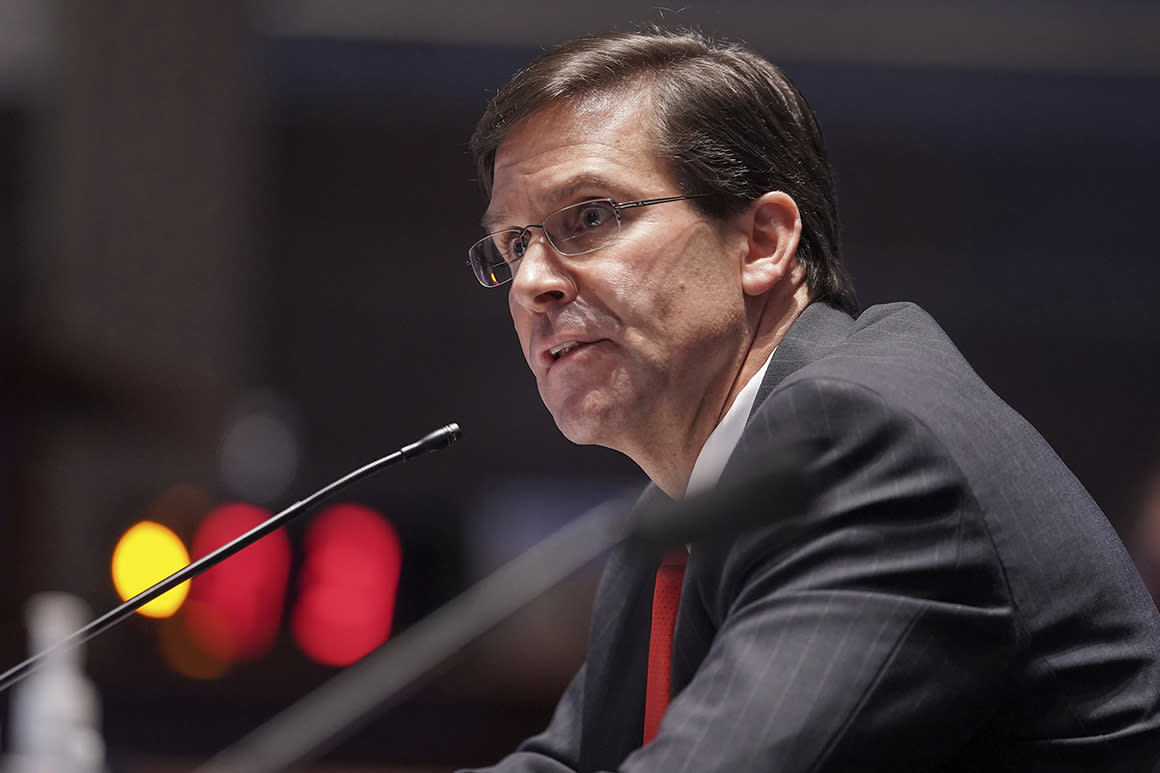Esper doesn't commit to keeping troops away from polling stations

- Oops!Something went wrong.Please try again later.
Defense Secretary Mark Esper stopped short of committing to keep troops away from polling stations next month, prompting Democratic lawmakers to call on the Pentagon chief to vow that the military won't be used to influence the election.
Reps. Elissa Slotkin (D-Mich.) and Mikie Sherrill (D-N.J.) told reporters on Tuesday that Esper was evasive in written answers to questions they submitted on the politicization of the military and the role of the armed forces in a peaceful transition of power.
The pair contrasted Esper's responses to Joint Chiefs Chairman Gen. Mark Milley, who recently vowed the military will have "no role" in the coming election.
"[Milley] answered in terms of what he would do as a Cabinet-level official, but took a serious nod towards what he knows is the apolitical reputation of the military and demonstrated how important that was to him," said Slotkin, a former Pentagon official and CIA officer. "We heard no such thing from Secretary Esper."
Sherrill, a retired Navy officer, called Esper's answers "boilerplate" and said the Pentagon chief "did not give us the sense that we could believe that he understood that this was such a critical time."
The pair pressed Esper on a host of issues, including whether he would refuse an order to send active-duty troops to be present at polling places. In multiple answers, Esper replied, "The U.S. military has acted, and will continue to act, in accordance with the Constitution and the law."
The lawmakers insisted Esper should go further, and cited his opposition over the summer to invoking the Insurrection Act to deploy active-duty troops in response to protests across the U.S. The move put him publicly at odds with President Donald Trump, and Esper is largely viewed as on the outs regardless of the outcome of the election.
Since taking office in July 2019, Esper has sent repeated messages to the force reminding them to stay out of politics.
Chief Pentagon spokesperson Jonathan Hoffman said Esper and Milley's positions on the military's apolitical standing "are well known" to lawmakers and the public. He argued the pair "provided thoughtful, factual and legally accurate answers" to Congress.
"Their responses clearly avoided wading into deliberately phrased and politically-tinged questions from members," Hoffman said in a statement. "We will take the opportunity created by this renewed, undeserved criticism to restate that regardless of how lengthy a political hypothetical question from a member of Congress may be, the Department will persist in remaining apolitical. Period."
Milley, the military's top officer, told NPR in an interview this weekend that the armed forces play no role in domestic politics and said he is "very confident" in the ability of civilian institutions to resolve election disputes.
"We, the U.S. military, we are sworn to obey the lawful orders of our civilian leadership," Milley said. "And we want to ensure that there is always civilian leadership, civilian control of the military, and we will obey the lawful orders of civilian control of the military.
"This isn't the first time that someone has suggested that there might be a contested election," Milley added. "And if there is, it'll be handled appropriately by the courts and by the U.S. Congress. There's no role for the U.S. military in determining the outcome of a U.S. election. Zero. There is no role there."
Milley's comments echo written answers he sent to the House Armed Services Committee in August arguing the military isn't part of the election process and won't resolve a disputed election.
Slotkin also sent letters to Director of National Intelligence John Ratcliffe and acting Homeland Security chief Chad Wolf urging them to remain apolitical in the election process. Slotkin told reporters that the DNI, along with the directors of the CIA and NSA, have acknowledged receiving her letter, while DHS said it won't be able to respond until after the election.
"I think it's part of a bigger story that we're all about to embark upon, which is what does it mean to transition when a president has already laid the groundwork, both with his words and with his Cabinet supporting him ... when he is purposely trying to sow confusion and doubt on that transition process," Slotkin said.
Trump has repeatedly called into question the legitimacy of mail-in voting and other aspects of the election, which is just three weeks away.
Fresh concerns about politicization of the military emerged on Monday after Trump's campaign ran an online political ad featuring an image of Esper and Milley. A defense official said the campaign didn't seek approval from Milley to use his image.
"I think I texted it to a group of 10 of us service and veteran freshman just like, 'I'm going to leave this right here.' And I sent it to the chairman of the House Armed Services Committee," Slotkin said of the ad. "Obviously, [it's a] major violation, and you've heard [Milley] come out, again, pretty clearly ... about his views, that it was a mistake, he had not given consent."
"Again, another sort of data point on a large, large graph of using the military for political purposes, which is why I think we have very little faith in some of our senior leaders right now, because we've seen them bend over every time the president wants to use the military in some political way," she added.
Also on Tuesday, House Armed Services Chair Adam Smith (D-Wash.) accused Trump of using the military as "props for his political gain."
"This new ad is no different. President Trump is trying to distort reality to fit a narrative that suits him politically — as he so often does — and this time, he is using photos of General Milley without his consultation," Smith said in a statement. "Our service members and the American people can see through these attempts for what they really are: cheap stunts.”

